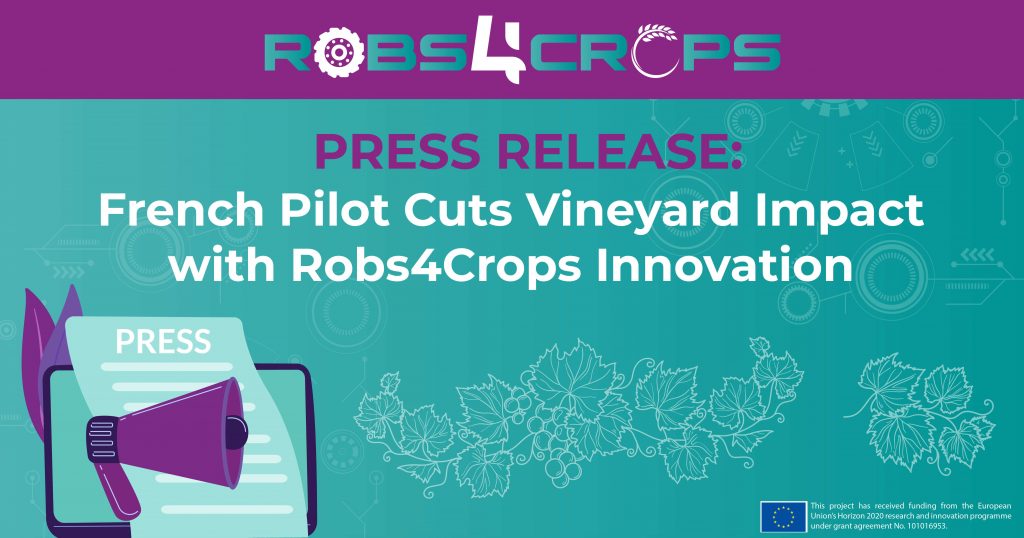The Robs4Crops project, a four-year Horizon 2020 initiative, has successfully concluded, advancing sustainable agricultural practices with cutting-edge robotic technology. The collaborative effort brought together 16 partners across eight European countries to develop smart implements, autonomous vehicles, and advanced planning software, streamlining key farming processes while reducing dependence on human labor.
The project included large-scale pilot programs across Europe in diverse settings such as vineyards, arable fields (sugar beets, pumpkins), and apple orchards in France, the Netherlands, Spain, and Greece. These pilots demonstrated innovative applications of robotics for tasks like mechanical weeding and precision spraying, highlighting their potential to revolutionize sustainable and efficient farming practices.
Key Success: Reducing Environmental Impact in French Vineyards
In France, a pilot project successfully showcased how robotic mechanical weeding can replace traditional chemical weed control in vineyards, significantly reducing environmental impact while contributing to improved productivity and efficiency of farming operations. The project utilized two advanced CEOL robots, specifically designed for vineyard conditions, equipped with a range of tools and technologies such as serrated discs, vineyard plough shares, knives, and multiple sensors to optimize.
These state-of-the-art tools—integrated with smart implement technologies like Fusebox and stuffing sensors—enabled precise weeding, using smart implements and automated systems. The advanced technology was further aided by the Farming Controller, an open-source digital twin software for planning, scheduling, and optimizing agricultural production by coordinating robots, implements, and machinery. Later, the progress of Robs4Crops has enabled a transition from AGC’s CEOL to Pellenc’s pre-commercial RX20 robot.
“The pilot progressed smoothly, successfully completing weeding across multiple plots,” said Bertrand Pinel, Senior Innovation Manager at Terrena Innovation. “Nearly 30 weeding passes were conducted in 2024 alone across 4 fields. Additionally, we deployed rotation sensors on the weeding implements to monitor for malfunctions, ensuring optimal operational success.”
The pilot covered several key plots, including Vinet (1ha), Moron (1.8ha), Jamet (2.4ha), IFV (1.35ha), Marchesseau (2.55ha) and Valettes (2.4ha), with a variety of environmental and technological assessments. Furthermore, the pilot hosted interactive demonstrations that attracted around 300 participants, providing a platform for hands-on learning, knowledge exchange, and collaboration with members of the broader agricultural community.
Next Steps: Advancing Innovation and Sustainability in Agriculture
By 2025, winegrowers, there are end-users are expected to benefit from the first commercial robots. However, their implementation will likely require substantial support as the ecosystem surrounding the robots and the economic model continue to develop. Essential components of this support include parcel data management, field surveys, spare parts supply and servicing, and user training programs.
Moving forward, Robs4Crops will focus on scaling the adoption of robotic technologies across European farming systems by supporting commercialization and forming partnerships with agricultural stakeholders. Efforts will center on facilitating knowledge exchange, providing training to farmers, and promoting hands-on learning to ensure smooth integration of mechanical weeding innovations. Additionally, the project will continue research to refine robotic technologies, enhance sensor capabilities, and explore AI-driven solutions. These actions will ensure the long-term impact of the project by advancing sustainable, efficient, and environmentally responsible farming practices.
Collaborating Partners
The pilot brought together key partners to deliver its success, including Terrena Innovation, Agreenculture, Agricultural University of Athens, Fundacio Eurecat, and the University of Copenhagen. These organizations played vital roles in supporting technological innovation, operational deployment, and research insights that contributed to the pilot’s achievements.
For more information on Best Practices and Lessons Learned from the four pilot projects within Robs4Crops, visit: robs4crops.eu/trials.

